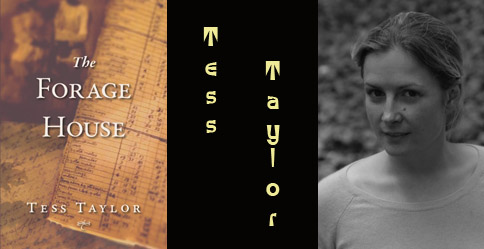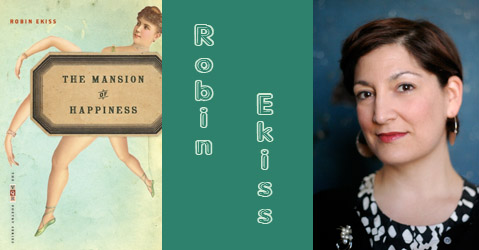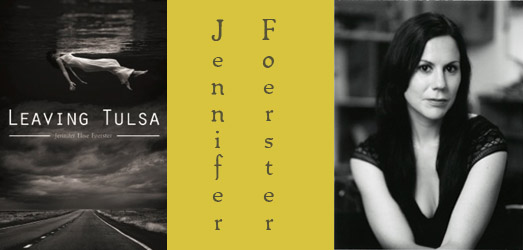Tess Taylor, Robin Ekiss and Jennifer Foerster
Monday, January 27 at 7:30 PM
1719 25th Street
Host: Tim Kahl
Tess Taylor was the 2010-2011 Amy Clampitt Resident. She has received writing fellowships from Amherst College, the American Antiquarian Society, the Headlands Center for the Arts, and the MacDowell Colony. Her chapbook, The Misremembered World, was selected by Eavan Boland and published by the Poetry Society of America, and her work has appeared in The Atlantic, Boston Review, Harvard Review, Literary Imagination, The Times Literary Supplement, and The New Yorker. She reviews poetry for NPR’s All Things Considered and teaches writing at UC Berkeley. She was the NPR News Poet on August 20, 2012 [http://www.npr.org/2012/08/20/159349948/newspoet-tess-taylor-writes-the-day-in-verse] Her book of poems, The Forage House, is published by Red Hen Press. She lives in El Cerrito, California.
Tess Taylor: Internal Geography
Cockle-shell shaped, each cavern-window
lies in its valley, its low promontory.
Whisper. Climb through one. Let yourself into
its antechamber.
Find how in spirals, its narrow bone-stair
ascends in a thin portico.
Its walls are taut and translucent as drum skins.
Doors quiver lightly as you pass through
and enter the rounded, dim vestibule
that slides down into a darkening channel.
Below, a bone hammer works a bone anvil
in the black cave sunk at the rise of the skull:
Wait now. From there, only fine nerves go,
forging the shape notes: your sound’s cargo
— from Painted Bride Quarterly
Robin Ekiss is the recipient of a Rona Jaffe Foundation Award for emerging women writers, a former Stegner Fellow at Stanford, and author of The Mansion of Happiness, which won the Shenandoah/Glasgow Prize and was a finalist for the Northern California and California Book Awards. She’s received fellowships and residencies from the Bread Loaf Writers’ Conference, Millay Colony for the Arts, MacDowell Colony, and Headlands Center for the Arts. Her poems have appeared in The Atlantic Monthly, POETRY, The New England Review and elsewhere. She’s a contributing editor at ZYZZYVA and on the executive committee of Litquake.
Robin Ekiss: ”The Lightning Fields”
At Ole Joney’s in Quemado, the men dance
like puppets in their boots, calling out
to us tourists, “Cowboys can do anything!”
We’re introduced to Rosevich and Dietrich?
the Austrians who will share the house with us
for the night. They photograph the register,
the barkeep, the painted skull above the pool table.
Dietrich takes pictures of Rosevich with her beer,
Rosevich with American Cowboys. He writes
He writes Budlite in a notebook, and stows
it in his pocket. They want to discuss American politics.
Instead, we wander among the steel poles
in the wet dark, and think of ways to explain them:
the light is white, the poles glow and disappear,
the space between them is like fog hanging in the trees.
from Painted Bride Quarterly
Jennifer Elise Foerster received her MFA in Writing from Vermont College of Fine Arts (July 2007) and her BFA from the Institute of American Indian Arts in Santa Fe, New Mexico (2003). She has received fellowships to attend Soul Mountain Retreat, the Naropa Summer Writing Program, the Idyllwild Summer Poetry Program, Dorland Mountain Arts Colony, and the Vermont Studio Center. From 2008-2010, Jennifer was a Wallace Stegner Fellow in Poetry at Stanford University. Jennifer’s poetry has been published in Ploughshares, Prairie Schooner, and other journals, and has been anthologized in New California Writing 2011 and Sing: Poetry from the Indigenous Americas. Foerster’s first book of poems, Leaving Tulsa, was published by the University of Arizona Press in 2013. Of German, Dutch, and Muscogee descent, Jennifer is a member of the Muscogee (Creek) Nation of Oklahoma. Jennifer now lives in San Francisco, where she works as a freelance writer and grants consultant for non-profits.
WOMAN ON THE STREET WITH LAUNDRY
In the birdcage of dusk the gray
pigeons gather. The bus is late. The evening
crowds. I wait beneath the purpling
shroud of fog, search for the moon
in the oil-slicked puddles, but it is only
the headlamps of cars washing over.
Dragging my laundry like a bag of
stones, I cannot go further than this
plexiglass shelter, the left-behind shadows
stickered to the walls where beside me
a woman peels her clothes off like petals.
The crows are trembling in her skeleton tree.
They beat their tattered wings against
the darkening bruise of sky. I drop
a dollar into her paper cup and sit on the
cold bench clutching my body. The shadow
is the most un-lonely of spaces. It has a boundary
like water. The moonlight dips its pail in it and shatters
our reflections. But here under streetlamps it
trails us and we follow, like this woman
brushing past me with her empty
shopping cart as the vacant all-night
laundromat whirs its white lights and the tide of
night crashes over my ragged little shadow.
I drop two coins in the murky reflection.
My laundry is tossed like bouquets of
ashes as the pigeons
scatter from the heaping gutters.
Detached now, my shadow is a puddle of
stars like booze shooters crushed in old
laundrywomen’s hands. My imprint in tar is
teeming with feathers. My body
is moonlight rippling clean.
—Jennifer Foerster (originally appeared in Oregon Literary Review)







